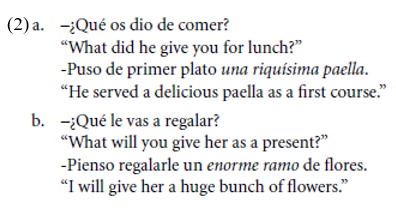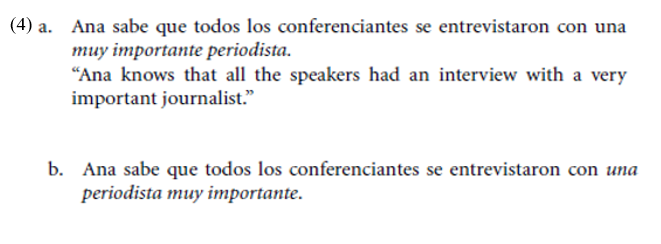
The specific/non-specific distinction and the position of evaluative Adjectives
 المؤلف:
VIOLETA DEMONTE
المؤلف:
VIOLETA DEMONTE
 المصدر:
Adjectives and Adverbs: Syntax, Semantics, and Discourse
المصدر:
Adjectives and Adverbs: Syntax, Semantics, and Discourse
 الجزء والصفحة:
P87-C4
الجزء والصفحة:
P87-C4
 2025-04-12
2025-04-12
 601
601
The specific/non-specific distinction and the position of evaluative Adjectives
In the previous section: Degree modification on pre- and postnominal adjectives, I described “extreme degree” or superlative adjectives as an exception to the correlation between position and N/NR interpretation. Since they express subjective judgments they are NR in both positions and they do not serve to establish partitions among classes or subsets. However, there are interpretive differences that depend on the position in which they surface.
Knittel (2005: §2.2) (following Waugh 1977) noted that adjectives such as magnificent, when postnominal, are used to introduce new information, while their prenominal position indicates that they are part of an anaphoric NP. The following French sentence illustrates this observation:

This apparent generalization does not hold in Spanish. The examples in (2) show contexts where new information is introduced when the adjective of subjective evaluation occurs prenominally:

I understand that the contrast in (1) is a subcase of another much noted and important distinction involving prenominal adjectives, namely the fact that, in indefinite contexts, DPs with prenominal adjectives have a specific reading as can be see in (2). On the other hand, DPs with postnominal adjectives are ambiguous between a specific and a non-specific interpretation (Picallo 1994; Bosque 1996; Demonte 1999). Presupposition of existence of the journalist is clear in (3a), which can be continued as indicated; the same continuation is not acceptable in (3b) because the DP with an adjective following N gets a non-specific reading:

Consider now the sentences in (4):

As is known, a DP is specific if it always takes wide scope, even when embedded under a quantifier under which the DP would not normally be able to scope. In (4a), where the nominal with indefinite article and prenominal adjective is embedded under a universal quantifier, we find the referential/quantificational ambiguity characteristic of indefinites (Fodor and Sag 1982). The DP is specific on the referential reading and it takes wide scope. In (4b), which corresponds to the same sentence with the embedded nominal constructed with a postnominal adjective, the indefinite DP has only the expected narrow scope quantificational reading. Fodor and Sag (1982: 359) noted that “richness” of the NP correlates with referential understanding and loss of narrow scope quantifier interpretation for indefinites. Unexpectedly, a prenominal adjective appears to contribute to the referential reading of the indefinite. It is far from the objectives of this chapter to provide an explanation for these interesting facts. I only want to remark that (1), (2), (3), and (4) show again that there are reasons to assert that adjectives have a meaning contribution to DP which is due to configurational factors.
 الاكثر قراءة في Linguistics fields
الاكثر قراءة في Linguistics fields
 اخر الاخبار
اخر الاخبار
اخبار العتبة العباسية المقدسة


